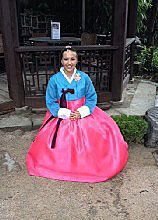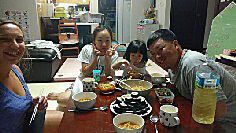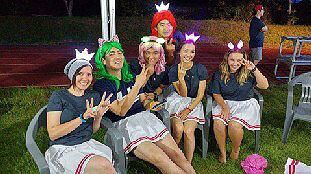Foreign Exchange Program
South Korean Reflections
Rachel Manning (Maryland – 2016)
Reflecting back (on what seems like only yesterday) I was heading on a plane traveling for my first time to Asia, specifically to the Republic of Korea. Even though my time in Korea has come to an end and I’m journeying through the second half of my IFYE program in Thailand, I made many fond memories and gained lifelong friendships. During my visit to Korea, I stayed with six host families and also participated in the IFYE Delegates Camp, which consisted of over 80 Korean 4-H members and IFYEs from eight different countries. The Korea IFYE, which did an outstanding job providing me with great host families, is supported through the Korea 4-H Association. From this experience, I was able to not only experience Korean agriculture but also the culture.
I ate many different Korean foods, but my favorite was “samgyeopsal” (삼겹살 grilled three-layer pork belly meat).

I enjoyed meeting the Korean people, and was treated at every opportunity with respect and warm hospitality; I even got to wear a “Hanbok”, the traditional dress of Korea and stay in a Hanok, a Korean traditional house, both of which I considered an honor. Each day was a new adventure for me, trying something new, but I would like to share a brief snapshot on Korean culture and my time with two of my homestays in Korea.
Korea is a country full of rich history, more than 2,000 years old. Much of the culture and customs still exist today as they have for centuries, although I haven't seen anyone dressed in their Hanbok for work. First and foremost, the Korean alphabet, known as Hangual, has been used to write the Korean language since the 15th century and is still used today. I found it a simple alphabet to learn as a foreigner and there were some similarities to the English language. I learned enough Korean language to feel comfortable while traveling and to anticipate the usual questions I would be asked.
When first meeting someone in Korea, you bow slightly as a sign of respect and state “annyeonghaseyo” (안녕하세요), which literally means “are you at peace?”
This is the traditional way of greeting in Korea. When I went on early morning runs around the local area, I often was greeted with warm smiles from Koreans and I, in return, greeted them by this saying. Also, paying respect to elders is one of the most prominent customs that exists in Korea. From an early age, Korean children are taught to honor their elders with respect by bowing first. In addition, respect is centered around meal times, with of course kimchi being served at every meal. The younger Koreans are conditioned to serve the elders first before themselves. When refilling drinks, elders are always filled first before oneself. An interesting custom before eating is to say “jal meokkessseumnida” which translates into “I will eat well.” This saying is thanking the person who is paying or who made the meal. I also said a slightly different phrase after eating, again giving thanks for the meal. Many polite forms exist for one word or phrase. Depending on who you are talking to, especially someone older (an elder), different expressions are used. This relates back to the Korea culture of respecting elders.
Lastly, one unique language custom that stuck with me is the idea of Korean sayings being collectivist. When talking with my host families, they often would use the word “our” instead of “my” in discussing various topics. Examples include “our home,” “our school,” and “our husband.” When speaking in the Korean language, the English phrase “my’ is translated into “our.” There is a funny story about the last example of “our husband.” When Grace and I were with our third host family, Ja young, our host sister mentioned that “our husband will take care of the laundry.” but referring that her husband would do the laundry. Grace and I laughed about discovering our newly formed marriage relationship and joked several other times when she mentioned her husband. This is a major difference from American culture where we are more prone to say “my house/my school,” instead of “our house/our school.” Korean culture is more collectivist than Western cultures such as the U.S. and emphasizes the importance of putting the group first before the individual.
When I left Korea, “Chuseok”, known as Korean Thanksgiving was coming up. Here, Koreans celebrate a good harvest, feast over a three day period, and family members pay respect to the spirits of their ancestors. Our Thanksgiving in the U.S. varies, but the harvest feast is a common theme with this holiday. In addition, another unique custom is that Koreans are one year old from the time they are born and get a year older on New Year's Day. Korean age can be either one or two years older than international age, which is different from our age system in the U.S. Another difference I learned is in regard to addressing people. It depends on if you're a male or female. For example, the term “older sister” is stated “unnie” if you are a female and “nunna” if you are a male.
Many more culture customs are present, but I felt these were the most important to discuss. In comparing the culture to the United States, our greetings are much different. In addition, we address people by their title and first name most of the time, with no difference based on gender. A prominent influence of U.S. culture is present in Korea. For instance, many common businesses like Starbucks and McDonald's, as well as several U.S. military bases, are scattered throughout the country. When it comes to meals, we have some similarities, such as giving a blessing before eating. We pay respect to elders, but I feel we are not as prominent in expressing it as I've seen in Korea. Learning to understand and accept the culture differences has led me to a greater appreciation of this wonderful country.

Now, moving on to my homestays: My first host family, who I referred to as “oppa” meaning “older brother” and “unnie” meaning “older sister” had a two year old daughter named Seoyeon. Both Grace (IFYE from OH) and I stayed with our host family for two weeks living in Yongin, a city an hour from Seoul. I was able to experience many “firsts” with this family. I harvested potatoes and helped feed beef cattle (highly prized Korean beef) on their family farm. With this host family, I learned many useful Korean words that would help me communicate throughout my time in Korea. Also, our family took us to many sightseeing places. My favorite was an underground cave and we also visited several young farmers in the Yongin area. We were also able to take part in several Korean culture traditions.
We witnessed a Korean wedding, made gimbap (Korea’s version of sushi), and celebrated Seoyeon’s birthday. Fortunately, Grace and I were able to meet up with our first host family several times during our stay in Korea, which made us very happy.
For our last host family, Grace and I stayed in Seocheon with our host brother named Sam who was a former IFYE participant to Switzerland. Sam along with his parents owned a sweet potato farm. During our stay we harvested sesame, sweet potatoes and chilies. Oh Seocheon, how I loved the area ... right by the sea, reminded me of my home in Maryland! So many fond memories of my time there, just to name a few ... I dug for clams near the sea, sang karaoke (known as noraebang), and even baked my first apple pie!

Another exciting event I attended was the National Korea 4-H Conference in Jeju Island, Korea’s very popular tourist destination. Over 800 4-H members were in attendance from each of the nine provinces of Korea. One highlight from the event consisted of a talent show where Grace and I, along with several other members from Seocheon Province, competed and danced to a popular K-pop (Korean Pop) song called “Cheer Up” by Twice. Our group won second place in the talent show; I had a blast dancing up on stage, and it may be the silliest memory of my stay in Korea!
I am grateful to have the opportunity to experience and learn about Korean agriculture. Agriculture in Korea is diverse; however, much is still imported from China such as fruit and beef from the U.S. A top agriculture product that is grown in Korea is rice, with many different varieties that are grown. I didn't stay on a rice farm, but learned about it at many local agriculture technology centers in each province I stayed. My second host family had a persimmon farm. I learned a lot about persimmons and I was able to experience my host father’s passion about advocating for persimmons. Agriculture in Korea is still a labor-intensive industry with the farms employing members from the local village, many of whom are women. I will never forget harvesting flower bulbs with my last host family. I was struggling with digging up bulbs in the dirt because of the heat and it was really hard on my back. Three local Korean women, all in their seventy’s, were helping also, but the heat and bending over did not seem to faze them. I couldn't believe how strong and resilient they were at farming. I hope one day I can be as strong and resilient as them.
With all the wonderful times I've had, there have been some challenges along the way. For me, I really like Korean food, but one challenge I found difficult was eating rice at every meal. Back in the U.S., my diet consisted of fruit, salad, meat, and vegetables. Eating rice every day took some getting used to and, even though I like rice, I consistently had to communicate to my host families that I only wanted a small amount of rice. Sometimes I didn't want rice at all and I found it hard to communicate this to my families. Rice is the main staple in their diet and eating a little usually makes me full. Many of my families thought I was on a “diet” because of the little rice I would eat, but I made sure to eat plenty of the vegetables and meat that they served.
I had the time of my life in Korea and observed that Koreans are kind and hardworking people who take great pride in their country. This experience staying with host families is something I will always cherish. I was able to fully experience learning about their culture through daily living, something not a casual tourist would get to experience. In closing, I would like to point out that I came here by luck, as I did not have this country listed as an option for me, but it turned out to be a very positive learning experience for me and I'm happy that I came to Korea. It’s a small world, after all, as I realized I had a personal connection to this beautiful country because my grandfather, Carl Manning, served in the U.S. Army during the Korean War. It means a lot to me to have been able to share with my host families this honored connection with Korea. I know my grandfather would have been proud to hear how many Koreans graciously thanked me for my grandfather’s service to their country. Here’s a last comment; from the Korean War came the separation of North and South Korea. Many Koreans I talked to about the separation are hopeful that one day the country will be peacefully reunited again, and I am hopeful for that, too!


